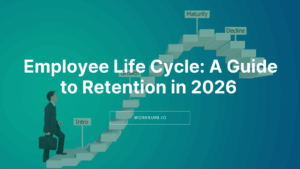Table of Contents
Employers receive verification requests every day — from banks, recruiters, landlords, and government agencies. Each request aims to confirm whether someone works at a company, what their role is, and in some cases, how much they earn.
While the task seems simple, it carries legal and reputational risk. Sharing the wrong information can violate privacy or impact someone’s future opportunity. That’s why employers must know what information can be released for employment verification, what requires consent, and when to say no.
On the other side, employees have the right to know what their current or former employers might disclose. Whether they’re applying for a job, a mortgage, or a rental property, the information shared on their behalf can affect the outcome.
This guide outlines what information can be released for employment verification, when consent is required, and how both parties should handle the process with clarity and care.
What Is Employment Verification?
Employment verification is the process of confirming whether an individual works, or has worked, for a specific employer. It typically involves verifying facts such as job title, dates of employment, and employment status. In some cases, it may also include compensation details, depending on the nature of the request and whether the employee has authorized the disclosure.
The purpose of this process is to help third parties, such as employers, lenders, or agencies, validate the information someone provides on an application. For example, a hiring manager may want to confirm a candidate’s previous role, or a mortgage lender may request proof of income and job stability.
Verification can take place through direct contact with the employer or through a third-party service authorized to provide that information. While it sounds routine, employment verification requires caution. Employers must protect sensitive data while responding clearly and accurately.
Who Requests Employment Verification, and Who Handles It
Verification requests come from outside parties who need to confirm employment details before making a decision. These requests are common in hiring, lending, housing, and regulatory processes.
Who Typically Requests Employment Verification
- Prospective employers want to confirm work history before making a hiring decision.
- Banks and lenders check job status and income to assess credit risk.
- Landlords verify job stability before approving rental applications.
- Government agencies confirm employment for visa, benefits, or licensing procedures.
- Background check firms collect employment data on behalf of employers or agencies.
Each requester relies on accurate, timely information — often expecting a standard, formal response.
Who Responds to Verification Requests
- HR departments usually manage verification in structured organizations.
- Payroll teams step in when the request involves salary or compensation data.
- Third-party platforms handle verification at scale for large employers, using pre-approved data fields.
- Direct managers or owners may respond in smaller businesses without formal HR teams.
Employers should assign this responsibility clearly. Without a documented process, responses can become inconsistent, increasing the risk of oversharing or sharing incorrect information.

What Information Can Be Released for Employment Verification?
Employers can release specific factual information during the employment verification process. What they share must be accurate, documented, and appropriate for the type of request. While some details are safe to disclose in most cases, others require consent or should be handled more cautiously.
Information Commonly Confirmed Without Consent
The following details are generally considered safe to disclose, especially when the request comes from another employer, a background screening agency, or a financial institution:
1. Employment Status
Employers may confirm whether someone is currently employed or no longer with the organization. This often serves as the baseline for further verification. For example, a lender may need to know if an applicant still holds a job before approving a loan.
2. Job Title
Employers can confirm the most recent job title held. If the employee changed roles during their time at the company, some employers may choose to list all positions and the dates associated with each.
3. Department or Business Unit
This gives context to the role and may be helpful for recruiters evaluating a candidate’s experience in a specific field or operational area.
4. Dates of Employment
Employers can confirm the start date, end date (if applicable), and any rehire dates. This information helps verify work history timelines and supports accurate resume screening or background checks.
5. Type of employment
Employers may clarify whether the role was full-time, part-time, seasonal, contract-based, or temporary. This can be especially important for background check providers or companies with strict hiring criteria.
Each of these data points is typically documented in HR or payroll systems and can be verified objectively. Sharing only this core information helps reduce legal risk while meeting the needs of most verification requests.
Optional Information That May Be Shared Depending on Policy
Some companies allow the release of additional details if they have a clear policy in place or if the requesting party provides authorization. For example:
- Work location or office branch
- Supervisor’s name or contact information
- Rehire eligibility status (whether the person is eligible for reemployment
However, this level of detail may vary depending on the organization’s internal policy. Some employers choose not to disclose this at all, even when requested, to avoid potential complications.
Employers should never guess or provide information that is undocumented. If something is not clearly recorded, it should not be shared. Responses must remain neutral, fact-based, and free from interpretation or personal opinions.
Salary and Compensation: What Can Be Disclosed and When Consent Is Needed
When a verification request includes salary, employers must tread carefully. Unlike basic job details, compensation information is private and often protected under internal policies or data privacy regulations.
What May Be Requested
Lenders, background check firms, or government agencies may ask for:
- Base salary or hourly wage
- Bonuses, commissions, or performance incentives
- Overtime earnings
- Allowances or taxable benefits
These requests are common in mortgage applications or financial screenings.
When Disclosure Is Allowed
Employers should not share compensation details unless the employee has provided written consent. This can come through a signed form, email authorization, or via a third-party verification system with built-in consent.
Without explicit permission, the employer must decline to disclose pay. A standard response like “Salary details are not shared without written consent” protects the company and sets a clear boundary.
Moreover, companies should handle all compensation-related requests the same way. Inconsistent responses can lead to legal or reputational risk, especially if one employee’s information is treated differently from another’s.
Can Employers Share Why Someone Left the Company?
When an employee departs, verification requests may ask for the reason — whether it was a resignation, termination, or layoff. Employers often hesitate to respond to this, and for good reason.
In most regions, no law outright prohibits an employer from sharing why someone left. However, disclosing the reason without care can expose the company to claims of defamation or breach of confidentiality. Misunderstandings are common, especially if the departure involved disputes or performance concerns.
Most employers choose a neutral approach. Instead of giving a reason, they confirm that the person is no longer employed and leave it at that. Some also include the final date of employment. This avoids speculation and protects both parties.
What Should Never Be Shared During Employment Verification

Certain types of information fall outside the scope of employment verification and should not be shared under any circumstances. These details are either protected by law, unrelated to the purpose of the request, or considered confidential under standard HR practices.
Information Employers Must Withhold
- Government-issued identifiers, such as Social Security numbers or national ID numbers
- Health or medical information, including leave related to illness or disability
- Performance evaluations, disciplinary records, or warnings
- Internal HR notes or investigations not tied to formal outcomes
- Personal contact details, such as a former employee’s phone number or address
- Demographic data, including age, gender, marital status, religion, or nationality
Sharing any of the above can breach privacy regulations, expose the organization to legal claims, and damage professional trust.
When Employee Consent Is Required
When the information goes beyond basic job details, employers must first obtain written authorization from the employee. Failing to do so may violate company policy or data protection laws, depending on the jurisdiction. Types of employment verification requests that require consent:
- Salary or compensation verification
- Details related to bonuses, commissions, or benefits
- Information about work performance or conduct
- Employment verification as part of a credit, mortgage, or immigration process
In these cases, the requester — whether a bank, recruiter, or background screening firm, must provide proof that the employee has authorized the disclosure. This can be in the form of a signed document or digital consent submitted through a secure platform.
Consent protects both the employee’s privacy and the employer’s legal position. It ensures the employee is aware of what’s being shared, with whom, and for what purpose. Without it, even well-intentioned disclosures can become liabilities.
Employers should document consent carefully and avoid assuming that a verbal statement or email from a third party is sufficient. If in doubt, they should request direct authorization from the employee before responding.
Final Thoughts
Employment verification requires accuracy, consistency, and respect for privacy. Employers must limit their responses to documented facts, avoid sharing sensitive or protected data, and request written consent for compensation or performance details. Relying on a structured policy and keeping a clear record of what’s shared helps minimize risk and maintain trust.
Employees should understand what their employers are allowed to disclose and when consent is required. They have the right to review what was shared and can raise concerns if anything appears incorrect or unauthorized.
Handled properly, employment verification supports fair decision-making without compromising legal or ethical boundaries.





